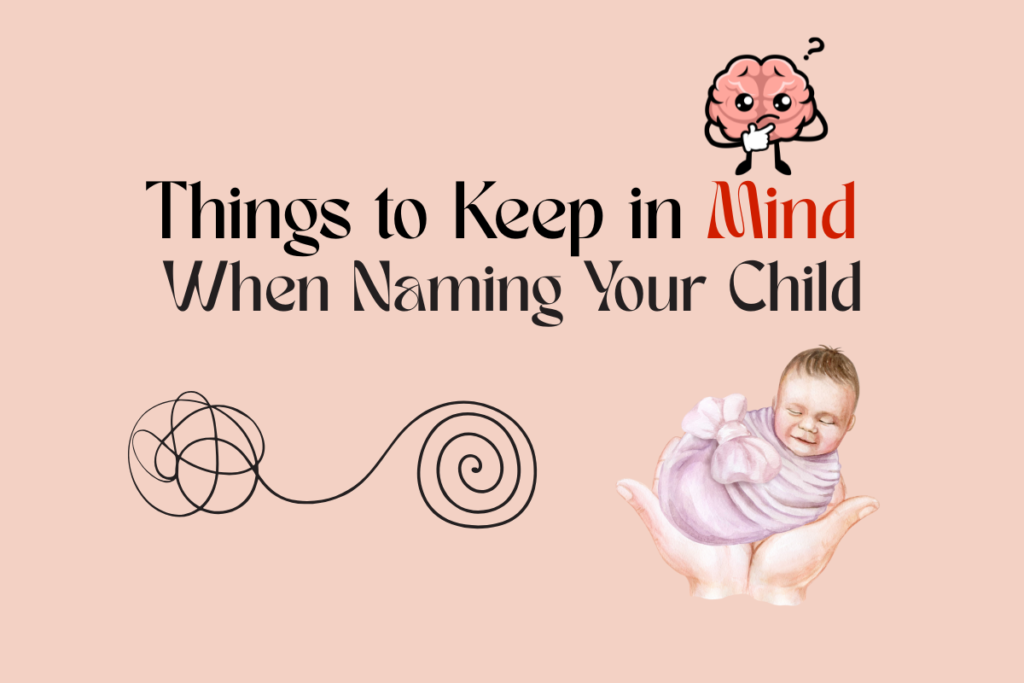भूलकर भी अपने बच्चों का यह नाम न रखें, वरना हो सकता है ऐसा !
Naming a child is an important and thoughtful task. A name not only becomes the child’s identity but also has a significant impact on their emotional and mental well-being. Therefore, we must keep certain things in mind when choosing a name for our children.
- Avoid Names with Negative Meanings: The name of a child should always have a positive and auspicious meaning. Names associated with sadness, death, suffering, or evil, like “Mritu” (death), “Dukh” (sorrow), “Vinash” (destruction), etc., should be avoided as they may have a negative impact on the child’s mental state.
- Avoid Controversial Names: Some names are associated with controversial or criminal figures, such as “Ravan,” “Kans,” “Dawood,” etc. These names should be avoided as they may create a negative perception in society.
- Avoid Funny or Teasing Names: Names like “Pappu,” “Golu,” “Tinku,” etc., which can become the subject of jokes, should be avoided. These names can lead to embarrassment or teasing in school or social circles, which can affect the child’s confidence.
- Avoid Overused or Common Names: Names like “Amit,” “Priya,” “Sonu,” “Priti,” etc., are very common. While they are lovely, they can make it harder for the child to establish a unique identity. Opt for a name that is distinctive but still easy to pronounce.
- Avoid Names that Represent Excessive Pride or Ego: Names like “Mahabali” (great strength), “Sarvashaktimaan” (all-powerful), “Chakravarti” (emperor), etc., should be avoided as they may foster ego or a sense of superiority in the child, which is not ideal for their growth.
- Avoid Caste, Religion, or Politically Charged Names: Some names are directly associated with a particular caste, religion, or community, such as “Brahman,” “Rajput,” “Muslim,” etc. These names may lead to discrimination or social division, so it’s better to avoid them.
A child’s name is a gift for their lifetime, so it should always be chosen with care and consideration. It is important to select a name that is positive, beautiful, and respectful. A name plays a vital role in shaping a child’s personality, so it should be chosen wisely.
This note provides guidelines for parents on how to select a meaningful, positive, and thoughtful name for their child. Let us know if you need any more help or suggestions!
🌑 1. Names with Inauspicious Meanings
Names that directly relate to pain, death, loss, or negativity were avoided.
- Mrityu (मृत्यु) – Death
- Rogesh (रोगेश) – Lord of disease
- Klesh (क्लेश) – Suffering
- Vinash (विनाश) – Destruction
- Tamogun (तमोगुण) – Symbol of darkness or ignorance
- Shoknath (शोकनाथ) – Lord of sorrow
⚔️ 2. Names Associated with Demons or Asuras (in scriptures)
Names of mythological villains or asuras were avoided to keep away negative energy.
- Ravana (रावण)
- Kansa (कंस)
- Duryodhana (दुर्योधन)
- Hiranyakashyap (हिरण्यकश्यप)
- Shishupal (शिशुपाल)
- Tarakasura (तारकासुर)
- Bakasur (बकासुर)
🧿 3. Names That Challenge Fate or Gods
Traditional belief discouraged names that directly invoke or challenge destiny, to avoid attracting ego or unwanted karma.
- Chiranjeev (चिरंजीव) – Eternal life (seen as overambitious)
- Vijayee (विजयी) – Always victorious (invites pride)
- Amar (अमर) – Immortal
- Devraj (देवराज) – King of gods (too grand)
- Ishwar (ईश्वर) – Literal word for God, considered too heavy
🧓 4. Names That Reflect Poverty or Helplessness
In rural traditions, parents sometimes used such names to “hide” the baby from evil eye — but they are not recommended for modern use.
- Bhikari (भिखारी) – Beggar
- Langda (लंगड़ा) – Lame
- Kanhaiya Bhoot (कन्हैया भूत) – Used to confuse spirits
- Nirasha (निराशा) – Hopelessness
- Kaalu (कालू) – Refers to darkness/black, sometimes used as decoy
🔥 5. Names Used as Nicknames That Shouldn’t Be Formal Names
Old nicknames were often used in rural homes, but elders warned not to make them legal names.
- Babu, Chhotu, Pintu, Tillu, Golu, Babloo – Too casual or childish
- Motu, Kaalu, Lalli – May invite body shaming or teasing later in life
📿 6. Names That Attract Too Much Ego or Pride
Names that were too grand or boastful were avoided to stay humble.
- Mahabali (महाबली) – Super powerful
- Jagatguru (जगतगुरु) – Teacher of the world
- Chakravarti (चक्रवर्ती) – Emperor
- Sarvashaktimaan (सर्वशक्तिमान) – All-powerful
- Trikalgyani (त्रिकालज्ञानी) – Knower of past, present, future
Summary in Simple English:
Indian elders traditionally avoided names that:
- Meant pain, sorrow, death, or disease
- Were names of demons or enemies of gods
- Invited pride, ego, or karma
- Were funny, mocking, or childish
- Suggested poverty, weakness, or deformity
- Were too heavy, divine, or grand for a normal human
